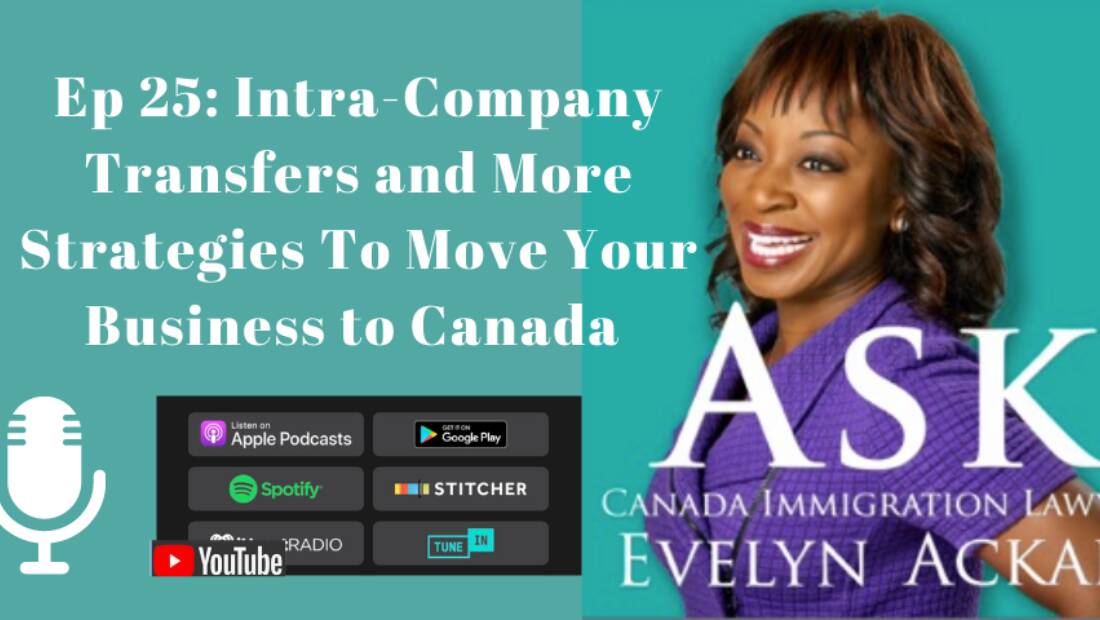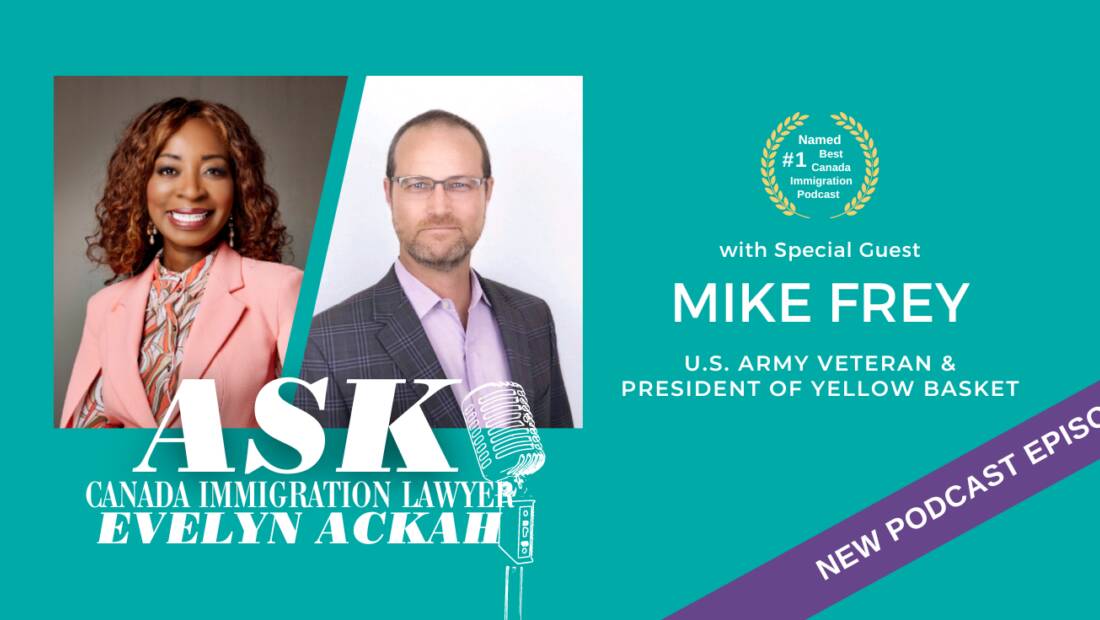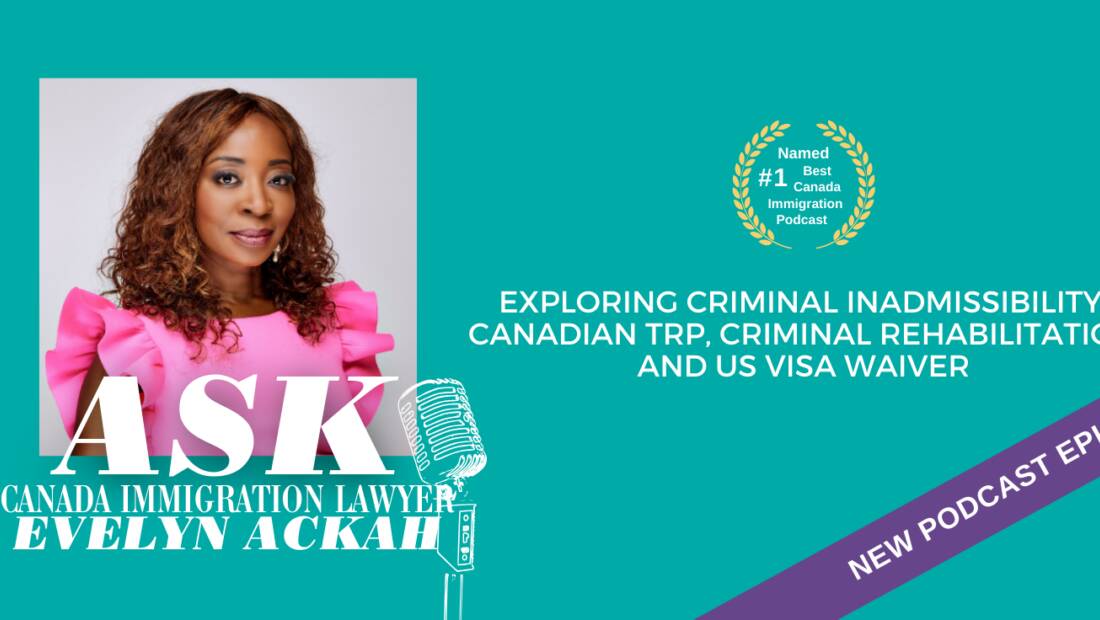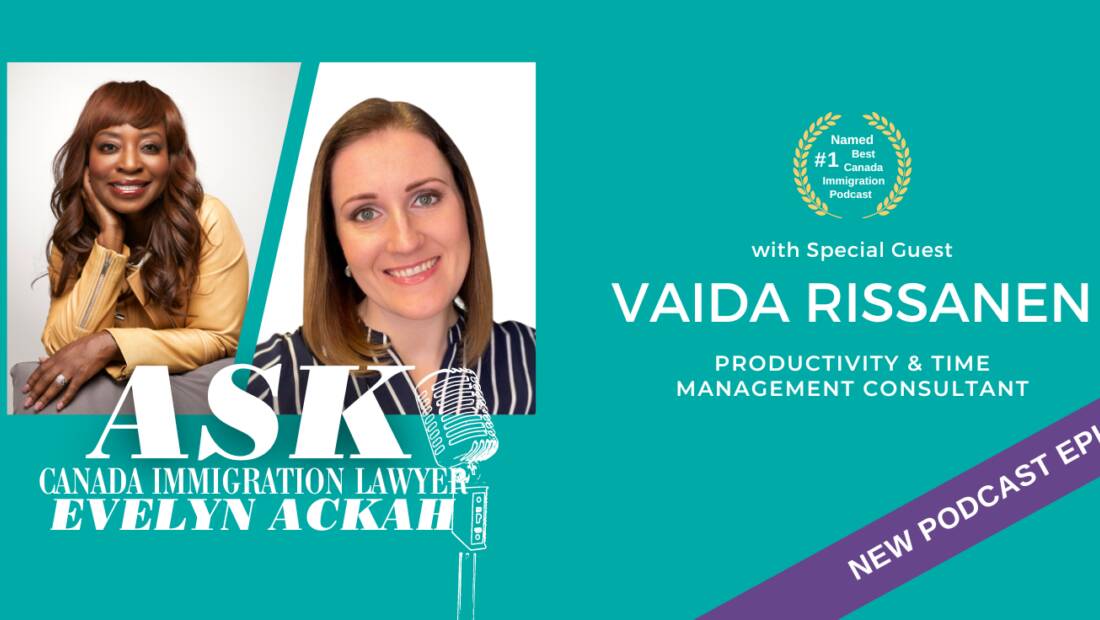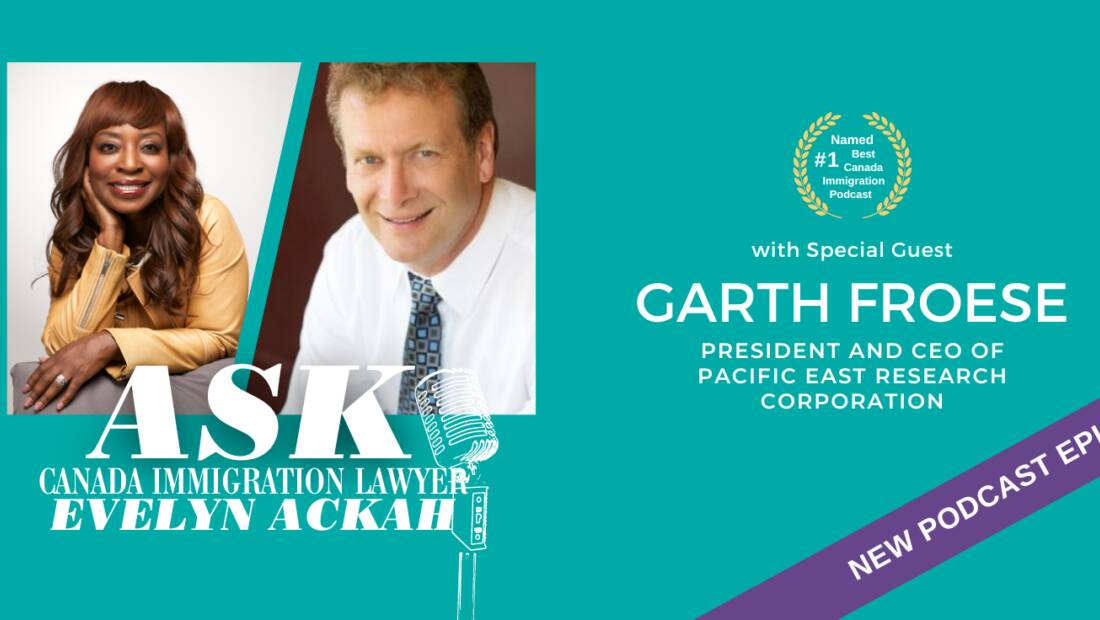Or listen on your favourite podcast app
How To Move Your Business To Canada
Do you want to move your business to Canada? Do you also want to bring yourself and your family to Canada? As a business and personal immigration law firm, we work with successful and professional business owners from all over the world. We've helped many entrepreneurs and business owners move their businesses to Canada. In order to help you be successful, we need to understand:
- What do you do?
- How big is your business?
- How many employees you have?
- What kind of revenue you have?
- How long have you been in operation?
- What are you working on?
- Who is your client base?
- What's your ideal client?
- What is your vision is for moving to Canada?
In this podcast, business immigration lawyer Evelyn Ackah explains the steps to move your business to Canada:
- incorporation
- tax issues
- intracompany transfers
- work permits
- citizenship or residency requirements for business owners
- buying an existing business versus moving a business
- structuring your business
- naming your business
- shareholders
- NAFTA opportunities for American and Mexican citizens
We work with successful and professional business owners from all over the world. For more information on how to move your business to Canada, and immigration to Canada or the United States in general, Ask Evelyn Ackah at Ackah Business Immigration today at (403) 452‑9515 or email us directly at contact@ackahlaw.com.

Transcript
Evelyn Ackah:
Good day. This is Evelyn Ackah from Ackah Business Immigration Law. I hope you're well. I'm also doing a Facebook Live today, with respect to the podcast, Ask Evelyn Ackah, Immigration Lawyer. So we're doing two-in-one today, and we're looking forward to sharing all information we can, about immigration law and about how to get to Canada with your business. At Ackah Business Immigration Law, as you know, we do both corporate immigration, which is the name, Ackah Business Immigration Law, and personal immigration.
Evelyn Ackah:
And I want to talk to you today about, those of you who reach out to us on a regular basis with businesses and looking to find ways to move to Canada with your business. So this is really one of our areas of expertise. We love to do this. We love working with successful and professional business owners, from all over the world. And a large part of what we do is help them with strategizing around how to come to Canada and how to bring their families to Canada, as well as, how to bring their business to Canada.
Evelyn Ackah:
So when we get a call like this, the first thing that happens is, we usually do an analysis, learning more about their business. So we need to know, how big is your business, how many employees you have, what kind of revenue you have, how long you've been in operation and what you do? So that we can understand exactly what your business is all about, so that we can advise you on, if this is a viable option for you to move to Canada. So that's the first thing.
Evelyn Ackah:
So usually what we do is a consult after we do our initial call, but we usually need to deep dive into a one-hour consultation, which we charge for. So that we can understand everything about your business and that you also will know, what it is that we need to be successful for you. So we always want to know, what are you working on? Who your client base is? What's your ideal client and what your vision is for moving to Canada? Once we do that one in our consultation, it helps us figure out really, is this viable, are you going to be able to come to Canada and have a successful business and grow your business, as well as keeping your business back home in operation, that's obviously, what's required.
Evelyn Ackah:
So let's talk about the steps. In order to move an existing business to Canada or what we call, set up a related entity, which would be a branch or subsidiary, we would need to incorporate you in Canada. So we do this regularly, this is something that we've started doing over the last few years, because our clients need the support of, who is going to help them incorporate a business and how can they do this as smoothly as possible, without any stress?
Evelyn Ackah:
So once we establish that you have a viable business, you have strong revenues, you have employees that are in the home country that will stay behind and continue to run the business, we often look at the option of intracompany transfer. And this is a work permit category you can do from all over the world. It does not need to be from a specific country. It's not under NAFTA or under General Agreement of Trade and Services or other treaties. It can be from anywhere in the world, if you have a viable business. So what we do then is, we focus on incorporating you and we always make sure you have tax advice.
Evelyn Ackah:
This is something I tell everybody: before immigration starts the process, you must speak with a specialist in tax and accounting. We have references that we can share with you and give to you, so that you can start doing your due diligence and making sure everything is planning to go well. So once you've done all that, and you're ready to start, we then look at how we're going to incorporate your business. And so most people come from different countries. They want to own the business and they want to be the only directors.
Evelyn Ackah:
But as you know, in Canada, you need to have a Canadian director or a permanent resident, usually, in most provinces. The one or two provinces that you don't need to have them is in British Columbia. So most of what we do for our clients that don't have maybe staff or don't have people that they already trust or family members in Canada, is we incorporate them in British Columbia first. Because that's one of the few jurisdictions that you do not need to have a local Canadian director. And then once we incorporate, we can always do an Extra-Provincial Registration, where we can move you and where your business is going to be base.
Evelyn Ackah:
So if you want to be based in Ontario, after we've incorporated you in British Columbia, then we would be able to move you, by way of Extra-Provincial Registration, to be registered in the province where you actually want to do business. So, it's not like we're doing it in British Columbia and you have to stay there. We're doing it so that you don't need to have somebody local from Canada on your board of directors, if that's not something that you want.
Evelyn Ackah:
I want to talk about the incorporation process in British Columbia and give you some information. Most provinces, as I mentioned for incorporation, have a minimum Canadian citizen or permanent resident requirement of 25%. And if you don't feel comfortable with that, you don't have to. That's why in British Columbia, you can incorporate as a foreigner. You don't need to have status to incorporate in Canada, in British Columbia. So whether it's a new business or buying an existing business, you can do that in British Columbia.
Evelyn Ackah:
When you have sought out tax advice and accounting advice, we know then, how you want to structure the business. Is it going to be a subsidiary? Is it going to be a branch company? And then we have to focus on first, will you be able to use the same name? So we have to do a name search in British Columbia. It's called a nuanced search with the Corporate Registry. Most of our clients are able to keep the names or have small changes to the name, but clearly know that the companies are related.
Evelyn Ackah:
Sometimes the company's name will have to be quite different from what it is in your home country, because it might be very popular and already used quite a bit in the jurisdiction. So the first thing is always, the name reservation with the Corporate Registry in British Columbia. Then we have to do the incorporation agreement, and then we have to prepare and file the Articles of Incorporation. At Ackah Business Immigration Law, we are helping our clients doing these steps on a regular basis, to help them get established.
Evelyn Ackah:
And the reason they're doing this is obviously, they want to incorporate, and then they want to transfer executives to Canada, under work permits, so they can start growing the business and growing it and becoming permanent residents. That's usually the long-term strategy. So one of the things that's interesting about even choosing a name is, it has to be distinctive. It can't just be Lily's Beauty Salon, it needs to describe what you're doing. You can't just be Bob. It needs to show, is it a restaurant? What kind of business do they do? Some part of the name has to show elements of what it is, they're planning on doing.
Evelyn Ackah:
So sometimes our clients will, it might have a name in another country, but we might put in there, consulting or software development, or something that describes what it is they're doing. So that it's clear to those that are working or doing the search, that this is what the business does. And we have to get the name approval before we can go to the next step of the incorporation process.
Evelyn Ackah:
In terms of shareholders, anybody can be a shareholder. It can be the company from back home, it can be residents of any country, you can be a shareholder as a director, whichever way you want to set it up. And this again, is why we start with the corporate tax advice. We need to know that you have already sought out advice, that you're structuring the business in Canada, the best way possible, and in the most tax-efficient way, that's what we want for you.
Evelyn Ackah:
And as I said, we provide services in that respect, by referring you to experts that do this exact work. We don't try to be all things to all people. We want to do the best work we do, with the things we do incredibly well, which is immigration, Canadian and US immigration law. Okay? And now, we're adding incorporation as well, to our services and our offerings for our clients, so we can help them.
Evelyn Ackah:
Part of the incorporation process will also require you to have an address. And many people say, "Well, I'm even there, how can I get an address?" The way we usually recommend, is use an address, you can get a shared office space, like a Regus address, and a phone number. You need to be able to indicate where the business will be registered, as the registered business of your organization. So a physical address is required in British Columbia. You've got a name or you can use a numbered company with, an operating as, those are options as well and we need a phone number. Okay? So those are all the requirements, usually to do an incorporation.
Evelyn Ackah:
Once the company is all set up, then we're able to focus on how to use the company, which is related to the one that you're operating back home, to use it as a mechanism, to move you to Canada, under the intercompany transfer. If you're American or Mexican, obviously we've got the NAFTA intercompany transfer. If you're from any other country, we can do just a straight intercompany transfer, where we have to show the companies are related and that you have executive managerial or specialized knowledge expertise you're bringing, to help grow this new business in Canada.
Evelyn Ackah:
Let's now talk about Extra-Provincial Registration. So we have now incorporated your business. How do you get to the province you want to do business in? That is called, Extra-Provincial Registration and every province allows this. So wherever you choose to operate, if it's not in British Columbia, you will need to register Extra-Provincially, so that you can do business in that province. And at Ackah Business Immigration Law, we help you with that as well. We help you determine the structure of your shares and all the things you need to know.
Evelyn Ackah:
Once the company is incorporated, and we are able to get you a work permit to come to Canada, depends on if it's NAFTA, it's faster, it can be done at the border. If it's not, and it's consular, it could take two to three or four months, to get you and your family members to Canada to start the business. Then this is where you start the process of going to the bank, getting your social insurance number, opening bank accounts, personally, as well as for the business and really launching your business plan, that you've indicated, was what you wanted to do here and actively being engaged in business.
Evelyn Ackah:
We also recommend for our clients, who are looking to become permanent residents later on, we recommend that they also consider making sure they're on the payroll in Canada. It's really important because you need to be able to show that you've been paying yourself in Canada and on a Canadian payroll and getting a T4. And all those indicators of running a successful business in Canada, are going to help you when you're looking to apply for permanent residence under one of the streams in Canada, after a year or longer. Okay? So those are things to think about.
Evelyn Ackah:
I hope it's been informative. Just so you know, again, we're always happy to talk to business owners about how to move to Canada, what they need to do to set up a business and how we can help them to smooth the way to Canada, for immigration, for business, for life, for any purpose at all.
But especially, if you want to talk through the strategy that I've just outlined, give us a call at Ackah Business Immigration Law, (403) 452-9515. We look forward to helping you create a legacy in Canada, for your business and for your family.
Take good care. Bye-bye.

